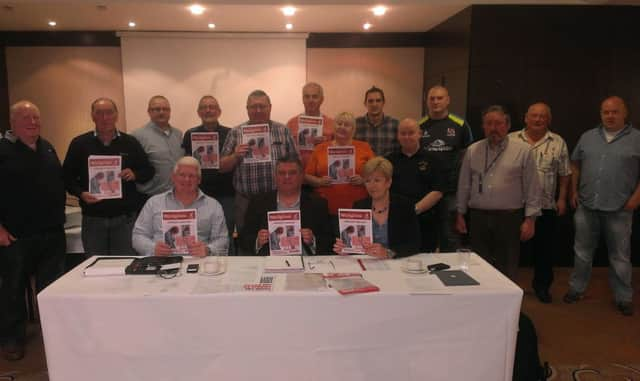Union meets in Londonderry to plan campaign to protect members from public sector rationalisation


The Unite union says it’s consulting members in order to identify pressure points wrought by what it sees as the unholy trinity of public sector voluntary exit schemes, the ‘rationalisation’ of services under the Review of Public Adminstration (RPA) and ever-reducing budgets at regional and local Government level.
Liam Gallagher, chair of the Irish Executive of Unite and a leading member of Derry Trades Council told the Sentinel: “If you take 20,000 jobs out of the public sector over the next four years - to date there have been 7,500 jobs taken out by voluntary exit - the Executive are spending £700m of borrowed money over the next four years to take those jobs out.
Advertisement
Hide AdAdvertisement
Hide Ad“Now it seems to me there are two outcomes of that. One is obviously the lack of disposable income and the effect that will have on the local economy. “And the second will be, the major one will be, that people will be expected to deliver those services with greater demand, with less people and less resources.”


Unite is concerned an increased and increasing work load on a reduced staff is already having an impact on the health and well-being of its members.
Those workers left behind are being expected to cover for those who have left, Mr Gallagher said.
“To a certain extent that has happened in certain departments. Managers have to restructure. Managers have to try and deliver services with less people and, in fact, greater demand. You can’t put a round peg into a square hole.”
Advertisement
Hide AdAdvertisement
Hide AdHe said the union intends launching a four step campaign to protect members.


This will involve pursuing a more aggressive policy against the sources of stress and bullying in public sector work places; carrying out an extensive survey of its members to identify pressure points; publicising the results of the survey and demanding an independent analysis of the results; and securing a commitment from political leaders to increase funding for public services.
“It’s no secret that the Northern Ireland budget will get smaller and smaller,” said Mr Gallagher. “We are currently facing reductions. We’re thankful this year that the spending will probably remain the same but that can’t be said at the next budget round and the expectation is that there will be considerable pressure borught to bear on all Government departments to find reductions, find efficiencies and that is, yes, that will mean more centralisation, more outsourcing and more pressure on public sector jobs”.
He said the recent merger of ‘supercouncils’ has brought its own pressures.
Advertisement
Hide AdAdvertisement
Hide Ad“Specifically, in relation to Councils, they have gone through the merger process, the RPA. Although their funding stream is slightly different they will come under increasing pressures and this is already evident in Belfast with the leisure services.


“There will be attempts to outsource. There will be attempts to find efficiencies and that will inevitable mean pressure on workers and pressure on management indeed,” said Mr Gallagher.
“Now Unite are in the process of consulting our members and, in fact, in Londonderry today, we’ve had a meeting with all of our representatives on local authorities in the north and indeed the education sector to consult them about launching a campaign, namely, a survey in the first instance to try to identify where the pressure points are, how that is affecting our members and what the likely prospects are in terms of the future”.